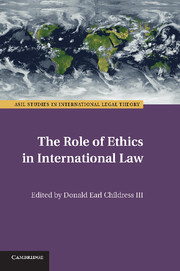Book contents
- Frontmatter
- Contents
- Contributors
- Acknowledgments
- Introduction
- Part one The Role of Ethics in Public International Law
- Part two The Role of Ethics in Private International Law
- 4 The Problem of Provenance: The Proper Place of Ethical Reasoning in the Selection of Applicable Law
- 5 Choice of Law as General Common Law: A Reply to Professor Brilmayer
- 6 A Reply
- 7 The Natural Law Challenge to Choice of Law
- 8 The Role of Ethics in U.S. Private International Law
- Part three Normative and Theoretical Perspectives
- Index
- References
4 - The Problem of Provenance: The Proper Place of Ethical Reasoning in the Selection of Applicable Law
Published online by Cambridge University Press: 05 December 2011
- Frontmatter
- Contents
- Contributors
- Acknowledgments
- Introduction
- Part one The Role of Ethics in Public International Law
- Part two The Role of Ethics in Private International Law
- 4 The Problem of Provenance: The Proper Place of Ethical Reasoning in the Selection of Applicable Law
- 5 Choice of Law as General Common Law: A Reply to Professor Brilmayer
- 6 A Reply
- 7 The Natural Law Challenge to Choice of Law
- 8 The Role of Ethics in U.S. Private International Law
- Part three Normative and Theoretical Perspectives
- Index
- References
Summary
Introduction
It does not matter whether you call the subject private international law or conflict of laws, because under either label the question how to go about identifying the applicable substantive rules of decision for multistate disputes is far from settled. This chapter addresses one unanswered question at the very foundation of choice-of-law theory: Are choice-of-law norms positive law, and, if so, what is their source? This issue will be called the problem of “provenance” because it combines elements of legitimacy and authenticity with the question of derivation or origin. It has particular salience to the following question: Does the American revolution in choice of law over the last half of the twentieth century have any relevance to other countries?
The problem of provenance is essential to the inquiry undertaken in the present volume because the proper role of ethical reasoning in private international law depends on its resolution. A judge is duty bound to enforce the law of his or her state, but he or she has no obligation to follow academic theorizing about the nature and purpose of law – which is what some choice-of-law theories mainly consist of. This question then arises: Why should a judge faced with a choice-of-law issue attach any importance to ethical reasoning that has no demonstrable grounding in his or her state's positive law? Should ethical reasoning be treated as authoritative, and if so, why?
- Type
- Chapter
- Information
- The Role of Ethics in International Law , pp. 101 - 124Publisher: Cambridge University PressPrint publication year: 2011



